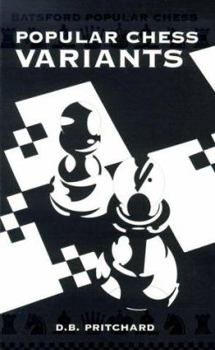Popular Chess Variants
This guide covers new and exciting games that can be played on a standard chessboard, as well as variants from the Far East such as Xiangqi and Shogi. The games are rapidly becoming popular, through recent major tournaments held in Germany, Georgia and elsewhere.
Format:Paperback
Language:English
ISBN:0713485787
ISBN13:9780713485783
Release Date:June 2003
Publisher:B.T. Batsford
Length:112 Pages
Weight:0.45 lbs.
Dimensions:0.5" x 5.5" x 8.5"
Customer Reviews
4 ratings
Good for what it is
Published by Thriftbooks.com User , 21 years ago
It's no encycolpedia of CVs (by the same author), but this book has its own merit, and is easier to get right now. It's got enough in here to keep you busy with a fellow chess nut for a while. It's also something you could just read in one sitting, for the simply interested, if you skip over the games scores. 20 games are presented, most with sub-variants. I would have liked to see more on ultima gameplay/strategy other than the "play usually takes place on the wings" and 2 annotated games. I found that odd, especaily because it talked about the fans liking it for its "subtle strategy". But, you could attibute this to the fact that there is not much material out there at all for this variant, and the fact that a work like this can't have alot of overall depth.
Excellent book on chess variants
Published by Thriftbooks.com User , 24 years ago
David Pritchard, author of The Encyclopedia of Chess Variants, has written a book that features 20 different variants of chess. Variants are given with rules, historic comments, and with examples of play. These are often very illustrative and interesting.Most variants are playable by two players with a usual chess set; in addition, shogi and xiangqi (Japanese and Chinese chess) are given. Overall, a book that I liked a lot, although The Encyclopedia of Chess Variants contains much more information.
18 Games of Fairy Chess and 2 Regional Variants
Published by Thriftbooks.com User , 24 years ago
There are three major regional variants of chess: Japanese chess (Shogi), Chinese chess (Xiang qi), and European chess (orthodox chess, FIDE chess, or simply chess). Of the three, Xiang qi is played by the most people; Shogi is the most exotic; and orthodox chess is the most thoroughly studied. It is the thoroughness of study of orthodox chess, and the wealth of literature on the subject, that makes chess variants attractive. If someone beats you at orthodox chess, he may have won simply because he had the better library rather than the better skill. Since chess variants are little studied, so the theory goes, the winner should be determined by the greater skill, not the greater library.Pritchard's book deals with 18 variations on the theme of European chess. Games of this type--which can be played on a regular chessboard with regular pleces--are usually referred to as "Fairy chess." The differences between Fairy chess variants and orthodox chess can be minimal, as in Displacement chess and Randomized chess, or profound, as in Dynamo chess and Ultima. Pritchard gives the rules for each variant, describes some simple strategy, and gives a few illustrative games. He tries to arrange the games from simplest (Extinction chess in chapter 1) to most complex (Dynamo and Ultima in chapters 17 & 18).He then finishes off the book with chapters on Shogi and Xiang qi, and an afterword describing certain chess variant sources.Pritchard reviews the following games: 1. Extinction chess aka Survival of the Species; 2. Racing Kings; 3. Displacement chess; 4. Randomized chess; 5. Marsellais chess; 6. Doublemove chess; 7. Losing chess aka Suicide chess; 8. Progressive chess; 9. Kriegspiel; 10. Alice chess; 11. Triplets; 12. Avalanche chess; 13. Hostage chess; 14. Co-ordinate chess; 15. Knight relay chess; 16. Magnetic chess; 17. Dynamo chess; 18. Ultima. 19. Chinese chess; 20. Japanese chess.Most of the games will be familiar to chess variant enthusiasts, but Triplets, Hostage chess, and Magnetic chess are relatively new and unknown. Chess variant enthusiasts will inevitably be disappointed that Pritchard left out their favorites. I wish he had included Chessgi, but given the logistical problems with playing Chessgi, I can understand why he included the similar game of Hostage chess instead.Almost all these games are included in Pritchard's earlier work, "The Encyclopedia of Chess Variants," which describes myriads of chess variants. If you're only going to buy one book on chess variants, get "The Encyclopedia of Chess Variants." It may cost a little more, but the few extra dollars brings descriptions of hundreds of extra games. If you're like me, and try to gather up everything you can find on chess variants, you'll have to have both books.
A *must have* for the chess variant enthusiast!
Published by Thriftbooks.com User , 24 years ago
This book covers twenty 'popular' chess variants in detail. The descriptions are clear and precise, with sample games and illustrative diagrams. Chinese and Japanese chess are included, along with the old favorites: double move chess, losing chess, and alice chess. Newer variants such as Magnetic and Hostage chess are also included for a great mix of interesting and playable chess variants. The great majority of the variants included in this book can be played with a regular chess set.Unfortunately, the book is paperback (glue binding) which doesn't bode well if the book is to be used heavily. I wish it had been offered in hard-cover. Other than this minor quibble, I heartily recommend this book to anyone interested in chess variants.






